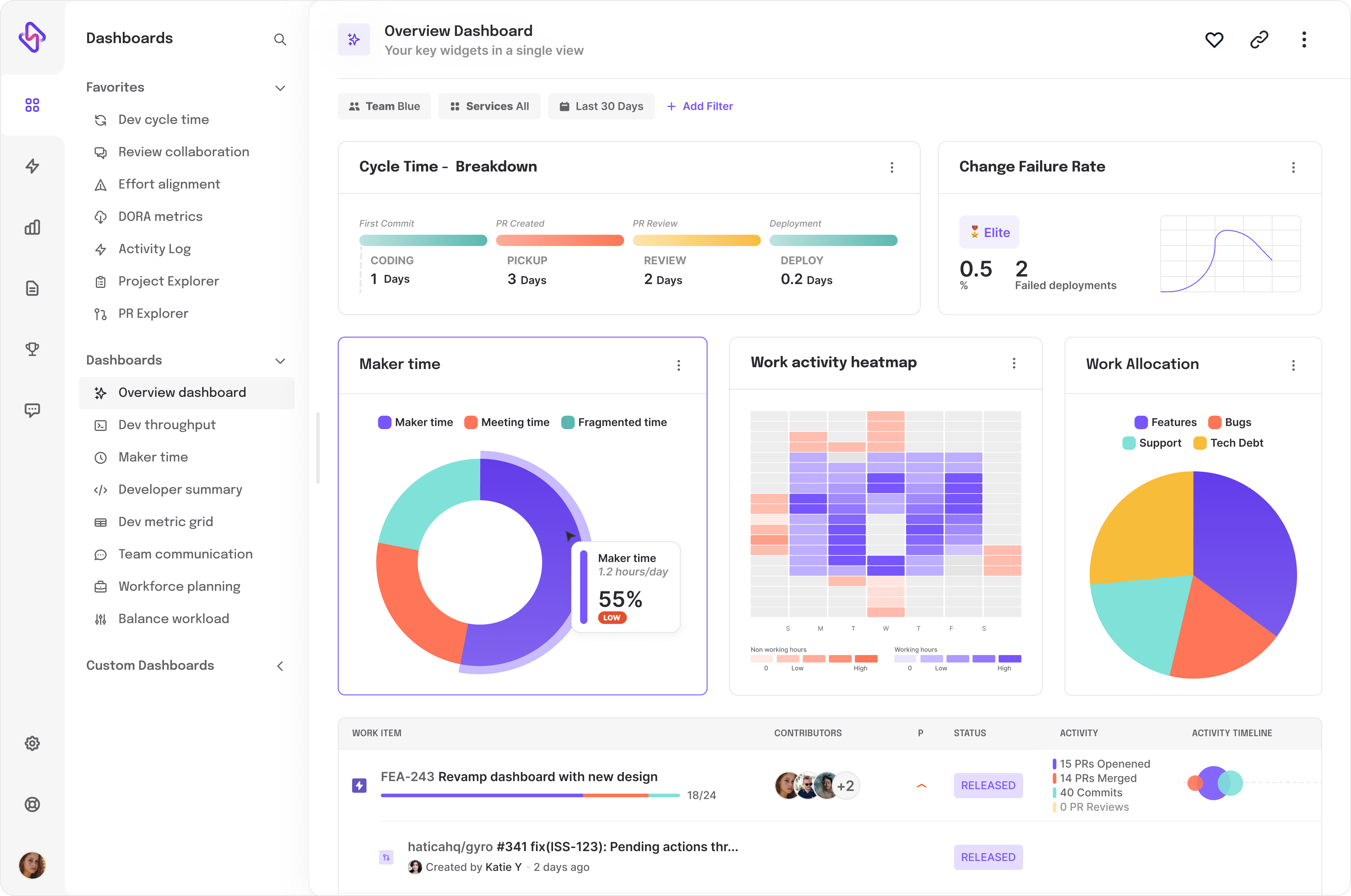3.3% of total engineers in the USA ever become engineering managers. If LinkedIn is to be believed, presently, the USA has 350,000+ engineering managers. We also found out that <20% of engineers ever transition to tech lead or engineering lead. Wait… aren’t they the same — Engineering manager & Tech Lead? No, they aren’t. And so, we thought of sharing with our Hatica community, a short guide on Tech Lead vs Engineering Managers—
- Who? — tech lead vs engineering manager
- Roles?
- Skills
- What suits you?
- Who should you hire?
Let's get started!
Who is An Engineering Manager?
An engineering manager is not an active contributor to the code repository. They are technically sound individuals who have excellent people skills and management skills. Engineering managers take care of people, processes, systems, and technology, and help influence individuals to bring the best out of them.
- Senior programmers & tech lead with extensive coding experience across domains, who also score high on EQ, people skills, and effective communication skills are the ideal profile for engineering managers.
- They evaluate new tech with POCs, and if worthy then help evangelize the same among their teams and help in its adoption in live projects.
- Effective engineering managers are well abreast of the SLAs (service level agreements between client & service provider) and take ownership of production operations and system monitoring. They also help identify & mitigate any impediments to the scheduled cadence (‘plan’ in agile project management).
Who Is A Tech Lead?
A tech lead or engineering lead is not a manager.
Like any other coder, a tech lead is an experienced active contributor to the code repositories, but unlike others, they can also guide the team through the rough waters, and technical bottlenecks that deter the team from shipping high-quality builds.
In short, they are highly skilled coding geeks and techies.
If you’ve seen the movie Jobs (the biopic on Apple’s founder Steve Jobs), then you may think of a typical tech lead as Steve Wozniak (co-founder of Apple who used to be engineering head at Apple in the early days).
- Undoubtedly, tech leads possess damn good technical skills, but they also have a fair understanding of the product, customer, and market dynamics.
- They can anticipate how the product may spawn in the future. And so, accordingly, they help the team implement the best development practices & software architecture suited for the scalability of the project in the future.
Tech Lead vs Engineering Lead - What's the Difference?
The main difference between a tech lead and an Engineering Manager is that a tech lead is primarily responsible for providing technical guidance and leadership within a specific team or project. They possess deep technical expertise and work closely with the team members, offering guidance, making technical decisions, and ensuring the successful implementation of projects.
Whereas an Engineering Manager has a broader scope of responsibilities. They oversee multiple teams or projects, coordinate resources, manage budgets, people management, and make strategic decisions. Their role involves people management, including hiring, performance evaluations, and career development.
Tech Lead primarily focuses on technical leadership within a specific team, while the Engineering Manager takes a broader perspective, encompassing team management, project coordination, and strategic decision-making.
Both EMs, and tech leads juggle multiple hats — techie, mentor, friend, and guide, to help fellow developers, unlock their performance, and feel truly happy/fulfilled with what they do.
Here are some major differences between the two.
Engineering Manager: Roles and Responsibilities
- Engineering team formation & hiring
- Facilitating teams in technical & project delivery roadmap decisions
- Help the team understand SLAs
- Process, operations & systems optimization
- Monitoring & tracking engineering KPIs to unlock team’s true potential
- Provides the team essential resources to overcome roadblocks
- Ensuring developer wellness, happiness, and success. Meeting their career expectations
[Read more: 5 Challenges Every Engineering Manager Must Overcome]
Tech Lead: Roles and Responsibilities
- Developing epic & story (unit product functionality in Agile development methodology)
- Alignment with cadence
- Scalable & secure software architecture
- Implementing best coding practices
- System integrations
- Code reviews
- Help the team in ticket resolution & production escalations
- Ensuring team visibility & recognition
- Help translate engineering efforts to business goals for engineering managers
- Collab with development, design, and QA teams to check SLA deliverables
- Influence the team to experiment & adopt new tech
Required Technical Skills for Engineering Manager
- Adept with modern software development practices
- Extensive coding experience
- Engineering, Product, and Project KPIs analysis & reporting
Required Technical Skills for Tech Lead
- Adept in at least 1 if not multiple programming languages
- Solid foundations of functional programming, and modern software development practices including cloud, edge, microservices, serverless, DevSecOps
- Great problem-solving skills for resolving tickets
- Sound knowledge of system design & architecture
- Code refactoring
- Managing large scale projects
What Soft Skills Engineering Manager Must Have?
- All as in tech lead, storytelling, and mentorship
- Leadership
- Good Communication Skills
- Emotional Intelligence
- Problem-Solving
- Decision Making
- Collaborative
- Adaptive
- Conflict Resolution
- Time Management
What Soft Skills Tech Lead must Have?
- People skills
- Good communication skills
- Team player
- Problem-solving
- Collaborative
- Helpful
- Adaptive
Tech Lead vs Engineering Manager: Which Role is a Better Fit for You?
Ideally, a developer flirts with multiple technologies and software development methodologies for years before stepping into the tech lead shoes, where s/he still spends the majority of time coding.
The number of years may vary depending on your work environment, but on avg, transitioning from developer to senior developer to tech lead may take 4-5 years.
If you possess or build the right EQ & soft skills alongside tech skills, you may further transition into an engineering manager’s role in the next 2-3 years. The trajectory ahead for engineering managers can be stepping into a VP of engineering role, CTO, or Tech consultant.
More than the number of years, your career progression will be a direct outcome of your personal inclinations towards tech & management, and your skills i.e., both technical and soft skills.
As engineers, we tend to be subservient about soft skills in general. Overcoming this is critical for transitioning into lead/managerial roles. It’s like not always the best batsman or bowler can be the best captain in a cricket team.
The question isn’t about the tech lead vs engineering manager role for you, the question is “do you want to switch from doing tech to managing tech?”. If the answer is yes, start building soft skills alongside tech skills.
Whom Should Organizations Hire — Tech Lead vs Engineering Manager?
First, both tech lead and engineering managers fit in all the agile development methodologies — including LEAN & SCRUM, and in traditional SDLC as well.
Second, again this is a misleading question. It’s not about choosing between hiring a tech lead vs an engineering manager, rather It’s about evaluating the maturity of your engineering team, and the scale of your engineering headcount.
- If your engineering org is very small with only 1 or 2 engineering teams, perhaps you need a tech lead for each team & a project manager. There is no need for an engineering manager for small teams.
- But if, within your organization, there are 3 to 6 engineering teams, maybe you can go with a tech lead in each team, 2-3 project managers in total, and an engineering manager.
Of course, the exact team composition would depend on the project and the organization.
Final Thoughts on the Role of a Tech Lead vs Engineering Manager
In summary, a tech lead is a savvy coder who is good at people and communication skills and uses them well to help the team deliver software consistently. And an engineering manager has been there, done that programmer who no longer codes but uses analytical tools like Hatica to monitor and analyze engineering KPIs and metrics to help tech teams execute effectively.
Subscribe to the Hatica blog to read more about unblocking developers, and boosting productivity with actionable engineering analytics.
FAQs
1. Who gets paid more, tech lead or engineering manager?
In general, Engineering Managers tend to receive higher compensation compared to Tech Leads. This is because Engineering Managers typically have broader responsibilities that go beyond technical expertise. On the other hand Tech Leads primarily focus on technical leadership and guidance within a specific team or project.
2. Is it better to be a technical lead or an engineering manager?
Ultimately, the choice between the two roles depends on personal strengths, interests, and career aspirations. Some professionals may prefer the technical path and aspire to become renowned experts in their field, while others may thrive in leadership and management positions, driving organizational success through effective team management.
3. Can someone be a good tech lead but not an engineering manager?
Yes, it is possible for someone to be a good Tech Lead but not necessarily excel as an Engineering Manager. Being a good Tech Lead requires strong technical skills, the ability to guide and mentor team members, and the capability to make informed technical decisions.
4. Is the Engineering Manager Higher Than the Tech Lead?
The engineering manager is in control of people, and the tech lead is in charge of the system. The same person could take on both positions if the team is small.






